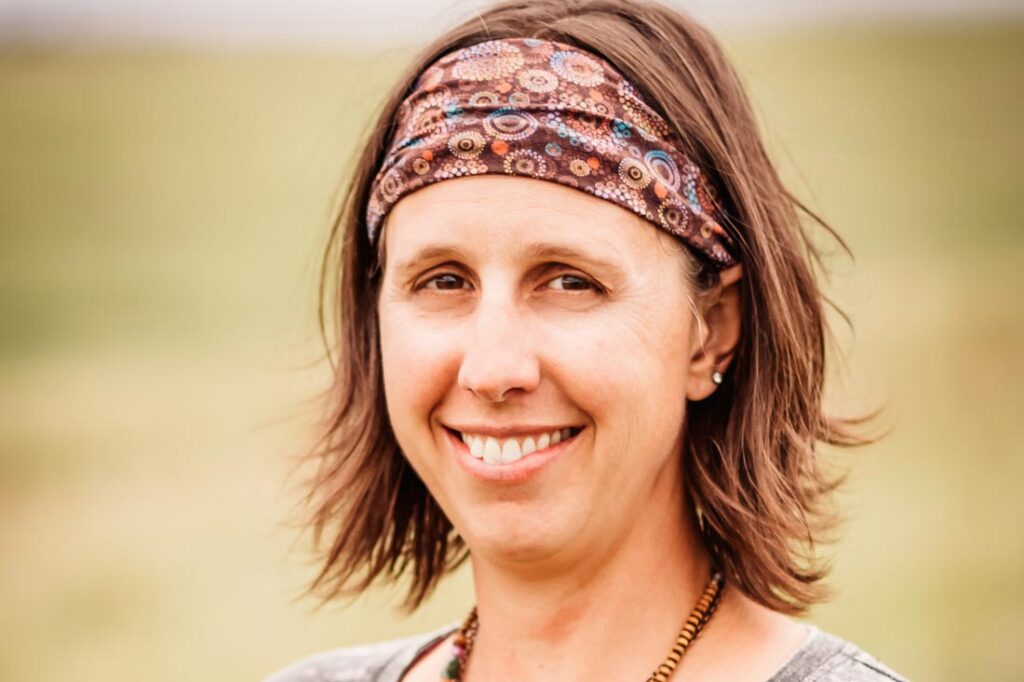Former hydrologist Lindsay Theken discovered her entrepreneurial spirit while searching for the perfect headband. “I created HeadPeace because I am a headband person,” her website bio reads, “and I wasn’t able to find the perfect headband in the marketplace.” As the founder of HeadPeace, she started to create fashionable head garments that would also fit an active lifestyle. Then she discovered Purnaa, a fair-trade ethical manufacturing company, and the mission changed. She wanted her company to help make the world a better place. That became possible through their partnership with Purnaa, which provides employment to survivors of exploitation, abuse, extreme discrimination and sex trafficking situations.
This interview has been edited for length and clarity.
How did you realize that you wanted to start a business?
Lindsay Theken: I have a background in hydrology, so I knew nothing about business. I actually worked in Alaska and flew around in helicopters and studied rivers—it was great! But [my husband] kind of planted the seed. Then, we had kids. I’ve been a stay-at-home mom with them, but once they got to be in school and I had time to myself, I wanted to do something but not go back to the traditional workplace.
Did you embark on any entrepreneurial ventures before HeadPeace?
LT: No, and it was a learning process for sure. I spent a lot of time studying how to start a business on my own and also used [my husband, who went to business school] as a solid resource.
How did you discover Purnaa and start that partnership?
LT: When I started HeadPeace, I had started looking into manufacturers, and almost all of the affordable ones were overseas in China. And I had no idea, but you hear horror stories about child labor and just the overall conditions in factories, so I kind of put the project on hold.
Then, I was sitting at my daughter’s gymnastics class one day, and there was this lady sitting next to me [who] I’d never seen before. I started talking to her, and she was like, “Oh, I live in Nepal, but I’m actually from here and love to travel. We actually just started a textile manufacturing company, and our goal is to help women coming out of slavery and trafficking situations get back on their feet.”
I’m not a religious person, but I refer to that as my divine coincidence. It was awesome because I got to know her and her husband, and we were able to sit down in the living room and talk about design. I know them, so I know what they’re doing is really amazing. They’re great people.
And what inspires the patterns and colors in HeadPeace’s designs?
LT: I’ve been using Facebook as a tool. Anytime I come up with fabrics and prints that I think I might like, I’ll put them out there and ask people to like their favorites. It’s a great way to just get a feel for what the best prints are. Honestly, I look for things that I like and kind of hope that people will like them. I have a wide range of prints, and I try to keep the color palette widespread as well.
What’s the biggest difference between HeadPeace headbands and another brand?
LT: The social mission is definitely a big selling point for these. They’re also super lightweight and a nice, soft material, but they’re stretchy. It almost feels like you don’t have anything on your head, and I did that on purpose because I get migraines.
When I started thinking about what kind of business I wanted to create, I picked headbands for a couple of reasons: One, they’re easy to manufacture and easy to ship, and two, I just couldn’t find the perfect one on the marketplace. You can fold these headbands and wear them like a normal headband or you can widen them up a bit. They’re versatile, so there are a lot of dudes who wear them. They’re not just a women’s product, which I love.
Without having prior business experience, what’s been the biggest challenge?
LT: Taking it to the next level is really difficult. I wish that I had a background in marketing. I think that’s going to be the next course I give myself. It’s really hard to make that jump from doing fine to taking it to the next level—and the fashion industry is pretty tough to break into.
How do you stay focused on what really matters to you?
LT: I think that as a business experiences a ton of growth, it would be easy to say, “Oh, this ethical piece or manufacturer isn’t working out—they can’t keep up with the growth. Let’s just find someone else.” And I just won’t ever do that.
To me, I’d rather not grow at a level that I can’t—or Purnaa can’t—sustain. Luckily, they can take on any order size, so it’s not going to be an issue on their end. But yeah, keeping it real, picking out my own patterns, dialing in on the fabric, keeping the quality at the level I want—that’s what’s important. Way more important than anything else.
This article originally appeared in the May/June 2023 issue of SUCCESS magazine. Photo by ©Photography by Milana.




